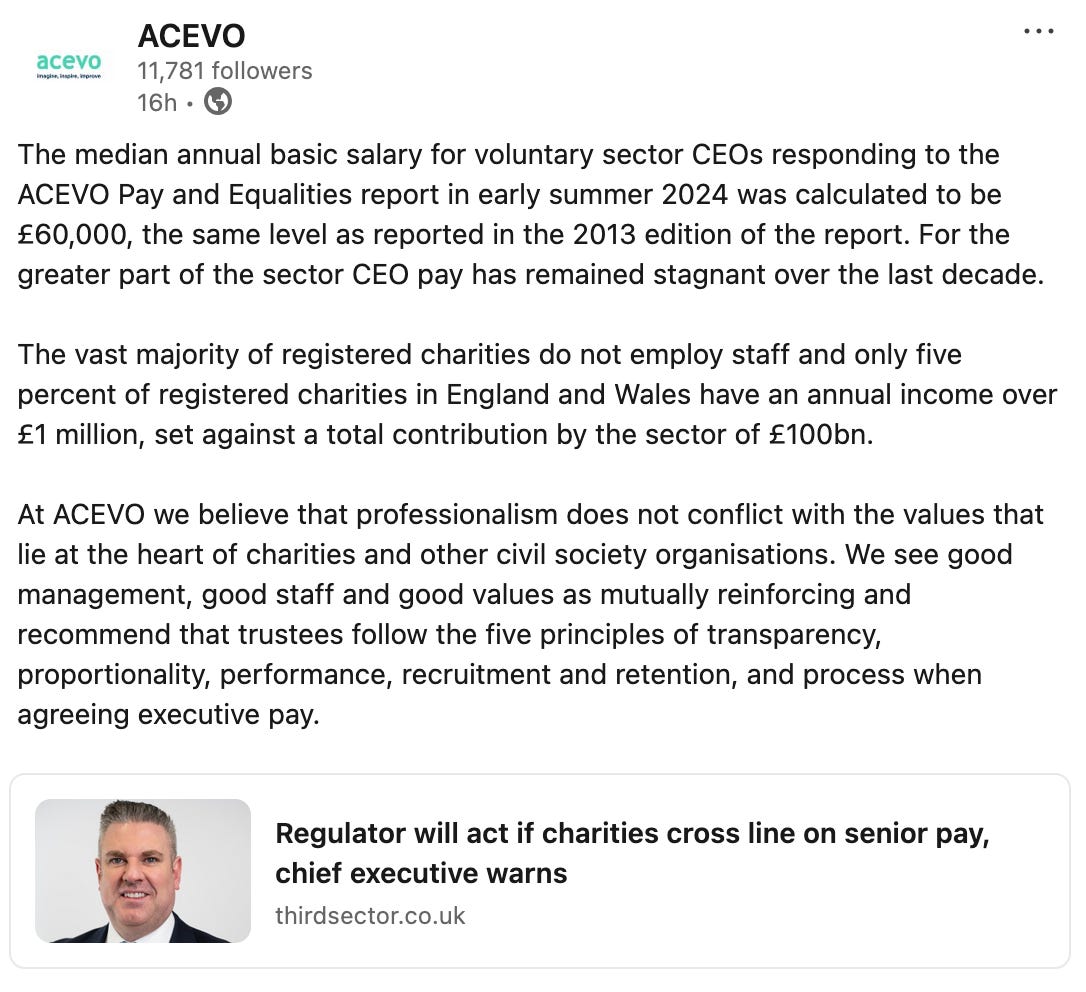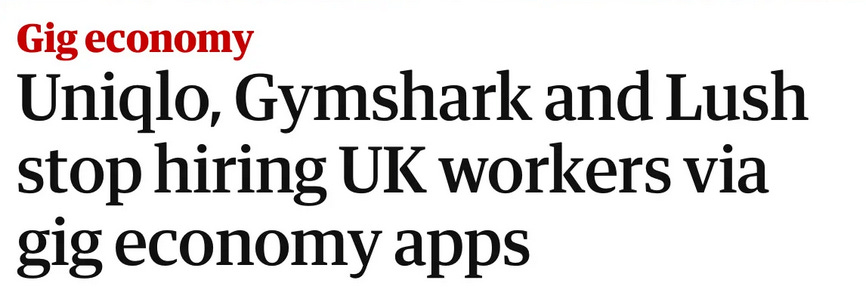Are Charities Just ‘Women’s Work’?
Plus, a modest proposal to rethink the Charity Commission. And meanwhile, do you want money from the new oligarchal, autocratic elite?
The Funny personal bit
Welcome to the latest edition of Barely Civil Society. BCS always gets the January blues, not least during periods of rising global fascism, but it also wasn’t helped last weekend by being forced to eat at Gordon Ramsay’s ‘Street Pizza’. I mean, the name is remarkably close to ‘pavement pizza’ and the food was pretty close too.
Did you know that the sister chain is called ‘Street Burger’? It sounds like something you’d say in Catford: ‘Oh my god, that bloke next door’s XL Bully has just done a massive Street Burger right on my lawn. What a complete Franco Manca!’
Anyway, apart from sticking to less brutal comestibles, probably one way to improve my mental health would be to get off LinkedIn or, as my iPhone constantly autocorrects, ‘Oinked In’. Now, on to musings and fumings on the weird, wild and sometimes just plain irritating world of the VCS.
Philanthropy, oligarchy, and autocracy
First, it’s pretty important to acknowledge the large orange fascist elephant in the room. And the comedy Gestapo officer standing next to him with the completely innocent hand gestures.

Oligarchies and philanthropy are perfect bedfellows. Current developments are pretty horrific for everyone. But they mean we need to take special care in our sector, especially as US models of individual philanthropy of the ultra-wealthy are increasingly pushed in the UK.
We appear to be diving back in the US into a new Gilded Age - a time when democracy fell underneath the ‘hubris and grandiosity’, as Robert Reich puts it, of an oligarchy formed of ‘robber barons’ who bought politics and politicians, rode roughshod over real people, and covered it all up with grandiose ‘philanthropic’ gestures which were largely to gratify their own egos. Opera houses, museums, and sometimes creepy company towns with decent homes and total surveillance, there may have been, but these people were also beating people senseless on picket lines, pillaging the planet, and exploiting people left right and centre, at home and abroad.
Later barons were both ‘philanthropists’ and open supporters of fascism and racism - like Henry Ford (of the Ford Foundation), whose vicious racism, and shared dim view of lefties, Jews, and unions, led him to endorse Hitler. Sound familiar?
Philanthropy - the ‘love of humanity’ played a substantial role in that age. It obscured the worst excesses of inequality, glorified the wealthy, and helped to reinforce an ideology that put social ‘usefulness’ and ‘efficiency’ at the heart of human care.
So I would expect philanthropy to play a role this time too, although the definition of what is strictly ‘philanthropic’ this time is further from actual human care than even the Robber Barons would have recognised. Sissy Space-X claims his grand public projects are philanthropic - they are of course nothing of the sort (indeed, many of them are designed to fail). Jeff Bozo says he will give most of his money to philanthropic projects. Expect those also to involve rockets and escaping the burned out husk of a planet that the rest of us will be clinging to.
All of those will happen as taxes are cut, and welfare and Government programmes destroyed. And of course, an American fascism which has been on the cards for decades now has a more explicitly racist inflection now the real president is a South African who grew up on the proceeds of an apartheid-era emerald mine.
I suppose what I’ve felt, seeing this happen, is more uncomfortable than ever about the sheer power of the richest in our society. And in our sector we have always had a very ambivalent relationship with wealth and the wealthy. There’s something more uncomfortable than ever about looking for voluntaristic donations from tax avoiders and plunderers of society who then parade virtue and distract from the inequality they create and desire.
Not every philanthropist or donor is Elon Musk - but the structure of much philanthropy focused on individual wealth must surely find it more untenable to shake off its association with oligarchy and autocracy in a time when democracy is in decline - just as it was in the original Gilded Age.
“Let me tell you about the very rich. They are different from you and me. [..] They think, deep in their hearts, that they are better than we are because we had to discover the compensations and refuges of life for ourselves. Even when they enter deep into our world or sink below us, they still think that they are better than we are. They are different.”
- ‘The Rich Boy,’ F. Scott Fitzgerald
Rachel Reeves to soften changes to non-dom tax regime after hearing ‘concerns’.
Chancellor says she will tweak finance bill amid effort to attract business leaders aand entrepreneurs to UK.
Heather Stewart, The Guardian 23rd Jan 2025
Next week, BCS will focus on the connections between philanthropy, autocracy and oligarchy in more detail as we look into the Effective Altruism movement so beloved of the kind of tech bros now queuing up to kiss Trump and Elon’s ring ….
Meanwhile, it’s time to take a look at our headline story. Yes, it’s time to look at exactly why charity work just isn’t meant to be paid.
1. Charity and the Commission: trouble in paradise?
“Large and complex charities must attract talented people to run them, but the public rightly expects the demands of executive jobs in charities to be balanced with the selflessness that underpins what it means to be charitable. So do we.”
- David Holdsworth, CEO, Charity Commission
Charity Commission defends CEO’s comments on high staff pay (Rob Preston, Civil Society, 22 Jan 2025)
The Charity Commission has defended comments its chief executive gave to a national newspaper at the weekend on senior pay after some sector leaders voiced criticism on social media. On Saturday evening, the Telegraph published an analysis of the regulator’s data, which showed that the number of employees in the sector earning more than £400,000 had risen from 27 in 2019 to 44 in 2024. It also showed that the number of charities paying such wages had increased from 14 to 19 in that time.
- See more at: https://www.civilsociety.co.uk/news/charity-commission-defends-ceo-s-comments-on-high-staff-pay.html#sthash.EcZhIUVB.dpuf
I can't be the only person whose heart sinks every time they see the Charity Commission for England and Wales pop up on the news. It feels a bit like when you get to school one morning, minding your own business and dreading double maths, and you realise that the school bully has decided to pick on you again. As the poking turns to blows raining on your head, you wonder, ‘What did I do? Why now? Does it have to be today?… Yes sir. I am an idiot. Yes sir. I deserve it.’
Sometimes I think it must be nice to be a plumber and not have to scan the news every day to see if the Plumbing Commission has told everyone not to trust you again - and then said they're doing it in order to increase public trust in plumbers.
So, TL,DR. The Torygraph published an article about senior charity pay, making it seem as if every charity CEO in the UK was earning a king’s ransom. The Charity Commission responded by saying that some of the big wigs (nb. mostly men) deserved stellar pay, but they expected people in charities to be ‘selfless’. Quite a lot of small charity CEOs put down their gin had a bit of a reasonable wobbler.
Now, the editorial in the Torygraph was slightly more sensible and even-handed than you would have expected after the nasty clickbait headline and the original article. (Of course, one might suggest that their dislike of ‘heavy-handed regulation’ is because most of the trustees and supporters of those biggest charities - especially the arts and health ones - read the Torygraph.)
But it’s fair to say that the way this tends to work is that the gutter press regularly comes up with a reason to beat charities over the head with a stick in a slow news week, and then goes to the Charity Commission, who give serious, rather tone-deaf comment which seems to confirm and add credence to the nonsense.
Meanwhile, charity leaders have ‘criticised commission chief’s tone-deaf commenrs on senior pay.’
At a time when we’re all experiencing absolutely crushing collapses in the sector, could we not just have a few months where we don't get kicked when we're down?
I really wish Lisa Nandy and the Civil Society Covenant would get to the root of this deeply unhelpful relationship. I have more hope for the CC now that the Tory political grip seems to have been slightly relaxed.
But I do wonder if there is a fundamental problem with the approach the regulator takes, which undermines public trust and provokes anger, rather than increasing it as it claims. I also think that the Commission is in something of a difficult position in that it constantly creates ever more baroque and complex rules and regulations which all but the most massive and professionalised charities have slim hope of even understanding, never mind following to the letter. But of course, most charities themselves do not have the resources to procure the skills or knowledge they would need, and nor indeed does the Charity Commission have real resources to help them.
The Commission then risks becoming an ever-greater burden on charitable work rather than an enabler. And without a dual develop/ invest and challenge, mandate, and the resources to match, it can’t do anything else.
There, I Fixed It
So here is a bag of a fag packet idea for the Charity Commission. I can’t imagine they will be calling any time soon, so I’m fairly safe suggesting it.
Could we…..?
Roll it in with NCVO or other another infrastructure body, and make it truly politically independent. It should have full representation from the charity sector itself - could it benefit from a model more like the GMC?
Turn it into a major infrastructure body with the responsibility for both support/ development/ investment, and a legal challenge/ regulatory function for the voluntary sector. The sector gets the resources to do its job better, and a powerful set of guardrails to ensure that it stays on the straight and narrow. Governments and press alike can know that the custodian of this work is making it better - not just punishing those who fall foul. (Although the latter makes for better news stories, of course…)
That way, governance and fiduciary responsibilities alone become no longer the main focus of charities, nor the Commission - truly, the goal becomes much broader and meaningful, and focused on public benefit and positive impact rather than a compliance that the sector, and the regulator, is not resourced to meet.
How do you pay for it?
Use half of NESTA’s endowment, or repurpose NESTA itself. (Sorry to the self-driving car enthusiasts.)
Tax trusts and foundations a small amount annually to top it up, and more if they don’t spend a minimum of X percent of their income per annum (which is a rule in the US).
The new body then shares the responsibility for continuously improving the sector, and invests resources into it happening directly. They are able to insist on formal training but also provide it. They are able to actively support good governance by more than a few (actually pretty good btw) videos and constant updates to baroque legal statutes that about 5% of trustees know or understand. They could also can support on a wider range of things, including issues like safeguarding, and indeed, good delivery and support of people - for which there is precious little high quality training.
Could that be a more helpful and healthy relationship than this poacher vs. gamekeeper approach which constantly sets people against each other? Wouldn’t that be more in the spirit of a civil society covenant that could make a real difference?
It strikes me that very few in the charity sector actually argue for less regulation. The majority of us have a fairly neutral opinion of the regulator, even if we see its requirements as painfully bureaucratic and difficult to meet, and are tired of the constant jibes. But this makes us very different from the other subjects of regulation: the water regulator, telecoms, the press, media, who constantly fight tooth and nail for reduced regulation, and of course, additional profit. It seems strange, therefore, that what can appear a combative, punitive and interventionist approach is considered necessary. One might almost suggest it’s just because we’re easier to push around - and a good distraction from the people our society really needs to regulate with an iron rule.
2. Payment? Stop being so selfish!
As for the content itself. I can see by now that everyone is delighted to be told they should be more ‘selfless’, and accept low wages if they are a CEO in the voluntary sector. If you saw ACEVO’s data, it laid out in the most basic of terms the fact that overpay is a complete non-issue. And here it is: you get up every day, thinking about your lack of decent pension, a whole career in the voluntary sector of underpay and temporary contracts, your stress-related health conditions, your ravaged social and family life, and you see somebody telling the press that you're meant to be 'selfless,' and publicly problematising your meagre pay.1
Your mum talks again about how terrible it is that all these charity CEOs get paid a fortune, and you have to remind her again what your job is. (Maybe this is just me.) We have seen endless research on how bad for people’s health being a charity CEO is. Fair Collective have just done another report which spells it out. As you can see from ACEVO’s work, charity CEO pay has stayed static for ten years.
These questions of pay and wider working conditions are part of a bigger cultural problem we face in the sector. We should ask, why do we still believe that people working in extremely stressful jobs in the VCS aren’t allowed to be paid properly.
Uberisation of the sector
This notion of selflessness in the sector—low pay and poor conditions being a badge of honour— seems to me to be feeding the broader casualisation of labour that’s reshaping the sector. As funding shrinks, and organisations become more risk-averse, the idea that charity work should be self-sacrificial can also be used to justify a transition to gig-based roles for skills that once provided stable employment.
I feel like we need to be careful in the rush to ‘freelance’, and recognise that people in the VCS have a right to make a living, whatever stage of their career they are at. Is the gig economy where we want to be? As we can see, it has rapidly undermined workforces in many other industries, where the negative effects of contractions or profiteering have simply been passed on to the people who make the day to day work happen, at any level.
Sarah Butler, The Guardian, Sun 5 Jan 2025
We’ve seen large numbers of senior/ mid-level staff being let go from charities hit by the funding crisis, and many of my colleagues have been talking about a remarkable concomitant ‘boom’ in the ‘freelance’/ ‘consultant’ supply out there. What worries some of us is that, increasingly, senior roles are becoming casualised. Many people will enjoy the freedom this gives them, especially if they have other sources of income (more on which later) which can smooth out the peaks and troughs, or indeed, mean they don’t need to make a full-time wage equivalent. Others will have health conditions or other factors (eg neurodiversity) that make short-term project work a better fit. Many will want more time to spend on caring responsibilities, or indeed, on just, you know, having a life. And let’s be very clear: the vast majority of charity consultants are ex-CEOs who have chosen freelance for their own health and sanity. In as much as this is a choice.
But for all those making a choice, there are others who are not - and as the sector shifts towards this model, many will no doubt be missing the chance to work for a living wage in a stable role as a professional in an industry they have worked in most of their adult lives.
I remember well a moment in a workshop on careers many years ago where someone who now made their money with a range of non-exec directorships on various housing boards talked about how wonderful it was that all these people in the charity sector were able to have flexible, portfolio careers. Struggling to find a permanent job, I pointed out that I knew quite a few people with portfolio careers - they worked two shifts in the off-licence, did cleaning for cash in hand when someone offered it, and topped up with babysitting when they had to. (As usual, I make friends everywhere I go.) And now, I look at all the deliveroo drivers on Catford high street waiting for their next delivery and think, wow, look at those portfolio careers! The flexibility! Wow, their work life balance must be amazing!
So, alongside greater flexibility, we might also be seeing a sectoral example of the death of the middle class professional happening across oiur societies - writ large in the VCS as we contract. You may have seen Gaby Hinsliff’s recent article on this in the Guardian. Gary Stevenson, meanwhile,. has been clear that one of the major issues driving our economy into the ground is the fact that we are losing a middle class property-owning class. Wanting a middle class used to be anathema to the left - but without it, as an essential bolster against the absolute gulf between ultra rich and poor, many of the benefits of even the hard-fought basics of social democracy will be lost.
Whenever we celebrate ‘flexibility’, and promote the fact that smaller charities have a wonderful opportunity to purchase skills on a freelance basis, I do have a concern that we are essentially heading towards an almost entirely gig-based economy for senior ‘professional’ skills in the sector. Some charities are of course exploiting this by driving down the amounts they are willing to pay people, and more and more, we’re seeing them advertise ‘freelance’ roles which are paid at fractional rates. This is not fair, and represents a casualisation of labour which is dangerous for the effectiveness and capacity of the sector (because many people will just leave it), but most of all leads us to that danger that all charities tend to fall prey to - we are so saintly that it’s okay to exploit anyone ‘for the cause.’ This has worked for many years for sessional staff in, for example, youth work, care work, and front-line staff provision. It was crappy behaviour then, and is just as crappy when it’s done to people in ‘professional’/ managerial roles.2
Of course most charity ‘professionals’ (by which we tend to mean more senior) are not in the kind of precarity the deliveroo riders who nearly kill me every day in Catford experience - yet. But that’s only because of the relative class privilege of many of those working in the sector in senior roles (because who else could afford to?).
I’ve also talked to several people recently about the fact that many of us are only able to work in the VCS, and particularly in freelance roles, because we have more ‘stable’ partners in the private sector. This tendency is mirroring shifts in academia, where more and more academics can only afford to really work in universities, at the early stages especially, because they partner with someone who can earn a decent wage. Likewise the arts. They used to call this ‘marrying well’…. And that brings me to another point….
3. ‘Patriarchy, meet Capitalism. Capitalism, meet Patriarchy. You’re going to get on great.’
If we’re asking why charity work has to be selfless, and poorly paid, and insecure, there might be other reasons hiding in there. I’ve been discussing this with female colleagues. I know that none of the below will be news to women readers, but I hope it’s still worth raising in the context of current issues.
Much of charity work is essentially ‘care’ work (‘caritas’). And ‘care’ work is still seen as women’s work. There are of course hundreds of years of amazing feminist scholarship out there on the role of women in ‘production’, and latterly on the role of women in the workplace. Most recently, I was reading about the ‘crisis of care’, in the work of Nancy Fraser, which outlines the fundamental division of ‘labour’. Similarly, care work is seen as naturally unproductive (because only economic production is ‘real’ production).
“The rise of capitalism intensified this gender division—by splitting economic production off from social reproduction, treating them as two separate things, located in two distinct institutions and coordinated in two different ways. Production moved into factories and offices, where it was considered “economic” and remunerated with cash wages. Reproduction was left behind, relegated to a new private domestic sphere, where it was sentimentalized and naturalized, performed for the sake of “love” and “virtue,” as opposed to money.”
- (Nancy Fraser, Capitalism’s Crisis of Care, Dissent Magazine, Fall 2014.)3
Alongside the fact that all care work is, in our gendered culture, still feminised, the charity sector of course benefits from a very real female workforce which is greater than in many other sectors - at all but the most senior levels in the largest organisations (go figure).
So, women might be forgiven for suspecting that part of the reason everybody is expected to accept poor pay, or indeed, to be ‘selfless’, is because the sector itself is somehow ‘women’s work’. Again, as Fraser puts it, “sentimentalized, naturalized, performed for the sake of ‘love’ and ‘virtue’ - not for money.”
Selfless.
Class, race, and many other things lie on top of each other here. But you can’t help feeling sometimes that if charity work was ‘men’s work’ it might not be expected to be done for free, or nearly free. Charity sector professionals have no right to fair equitable pay because… well, women don’t. The fact that men are the ones paid top dollar in the biggest corporate charitable organisations with the highest incomes seems to suggest that too.
Choice and equity is everything
Let me be clear: of course I agree flexible working is good for everyone, and especially for women, and various other people who may choose, for a variety of reasons, to take that option. The fact tyhat such flexibility isn’t offered within organisations, in substantive roles, is often one of the key issues that drives people into gig work. Let me also be clear that I certainly don’t believe work needs to be ‘economically productive’ to be valuable - and certainly, human beings do not.
But I also think people - women and men equally - should have a choice. And that those choices are being erased by collapsing funds in the sector, and deliberate attempts to limit fair pay for everyone. And as usual, women, and others who inhabit a feminised sector, are getting the even thinner end of the wedge.
These discourses, economic trends, and narratives are all linked. The undervaluation of charity CEOs, the rise of gig-based work, and continued feminisation of ‘charity’ sit alongside, and underpin, a deep-seated belief that the work we do in the sector is economically unproductive, and therefore less deserving of fair pay and stability. That belief is very much gendered, and it’s also being reinforced by economic forces that are hollowing out the middle professional classes, particularly in sectors related to ‘care’. If we want a sector that’s equitable and effective, we need to challenge the idea that selflessness means self-sacrifice, which then justifies unequal and unfair pay.
And I hope it goes without saying: what goes for people at the top goes double for the people at the bottom. From frontline charity workers to, indeed, people working in what we formally know as the social ‘care’ profession itself, it’s incredibly bad at the bottom. But that is another article for another day.
Meanwhile, please do feel free to spend some time caring for yourself your self. 4 If I could project a slogan onto the wall of every charity CEO, it would be ‘It’s just a job.’ Please put on your own life jacket first.
And finally….
Erm, I usually end with something funny, and honestly I’m not feeling at all funny.
But here is a picture of me when I’ve just seen a corgi. See, I’m nice.
Plus, I do this for free. Isn’t this the kind of person you’d like to buy a coffee? Or you could even work with me.
https://www.civilsociety.co.uk/news/charity-commission-defends-ceo-s-comments-on-high-staff-pay.html
I generally take a dim view of the notion of the highly classist concept of the ‘professional’, so expect me to contradict myself at some point soon in another post.
Fraser is continuing the whole long lineage of post-war feminist critique, which has focused on the fact that women have increasingly been expected to be ‘economically productive’ in terms of cash, as well as ‘socially’ in terms of care, or reproduction (what is sometimes called ‘social production’). She’s writing particularly about the fact that ‘care’ in society is becoming harder and harder to manage, not least because it is now expected that every single person must be economically productive - leaving other kinds of ‘production’ undone.
Okay, three things. First, please don’t email or shame me on social media and say ‘how dare you say childcare is women’s work’. If that’s what you think I’m saying, I don’t know what to say to you.
Second, yes, I realise I’m a man. The beard is a giveaway, although I’m all for flexibility. I’m trying so hard not to ‘mainsplain’ here but I just thought Fraser might be helpful, and also, I just think people need to say this stuff more. Note also: men who don’t really fit well into the patriarchy have a tendency to stick to areas where they feel more comfortable - for example one of the reasons I went into the VCS was because it was likely to be easier to be gay there in the late 90s. Men have an advantage with the top level jobs, but class, race, neurotypicality all have an equal role to play, and one which is much less discussed.
Third, yes I know the charity sector IS economically productive. The problem with ideology is that is has a very loose grip on reality. It’s worth noting that feminising welfare is another way that patriarchy and capitalism have conspired together to create massive inequality and to ensure that the drive for equity or a less capitalistic, fairer society, is neutered by locating it in a sector constantly circumscribed by establishment organisations like, um, well, the Charity Commission.





